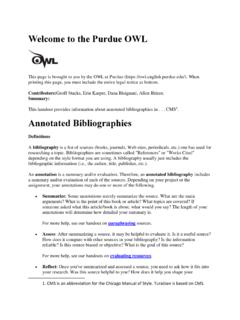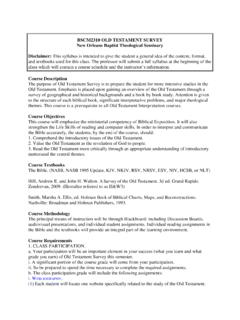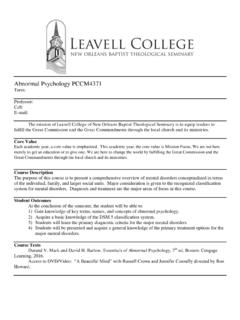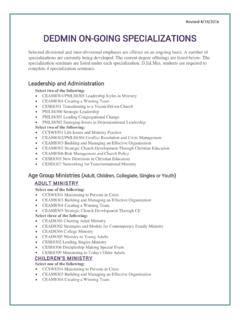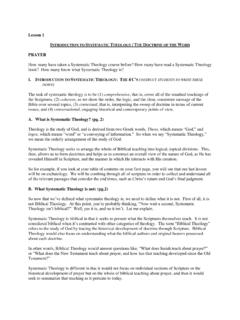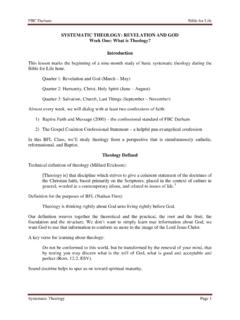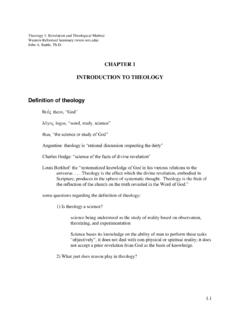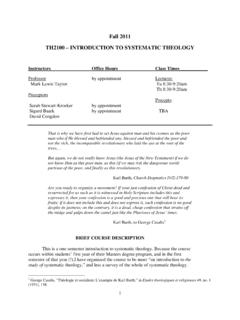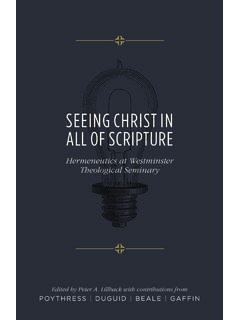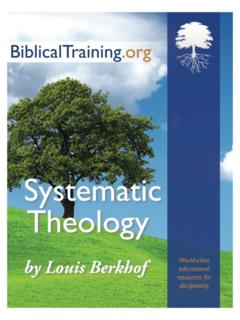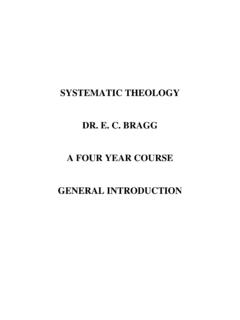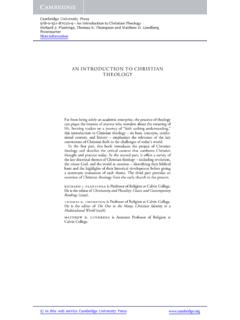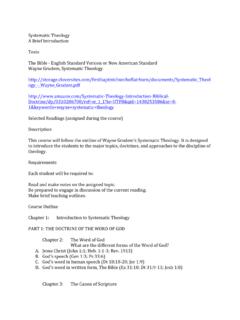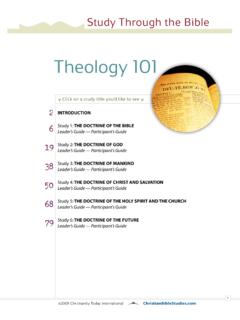Transcription of Systematic Theology I - NOBTS
1 Systematic Theology I T-TR 9:30-10:50 Fall 2015 Course Instructor Rhyne Putman, New Orleans Baptist Theological Seminary Twitter @rhyneputman Dodd 106 ext. 3247 Watch your life and doctrine closely. Persevere in them, because if you do, you will save both yourself and your hearers. 1 Timothy 4:16 The Mission of the Seminary The mission of New Orleans Baptist Theological Seminary is to equip leaders to fulfill the Great Commission and the Great Commandments through the local church and its ministries. Course Description This first course in Systematic Theology introduces the student to the methodology of Theology (Prolegomena) and the doctrines of revelation, God, humanity, and the person of Christ. The biblical foundations and the relevant historical developments are considered in construction of a Christian understanding of each doctrine.
2 Core Value Focus New Orleans Baptist Theological Seminary has five core values: Doctrinal Integrity, Spiritual Vitality, Mission Focus, Characteristic Excellence, and Servant Leadership. These values shape both the context and manner in which all curricula are taught, with doctrinal integrity and mission focus especially highlighted in this course. The core value focus for the 2015-16 year is mission focus. Student Learning Outcomes The student, by the end of the course, should: 1. Be able to understand theological method and the doctrines of revelation, God, humanity, and the person of Christ biblically, historically, and systematically. 2. Be able to apply Theology by integrating these doctrines into a coherent, comprehensive, and consistent Christian worldview.
3 Systematic Theology I T-TH 9:30-10:50 Fall 2015 p2 3. Be able to communicate these doctrines in the particular ministry calling and context of the learner. Biblical Authority This course operates under the assumption that the Bible is the inspired, totally true and trustworthy Word of God. While history, tradition, and reason play no small role in the theological task, the Bible holds ultimate authority in Christian doctrine and practice. The Baptist Faith and Message (2000) provides the structure of this course s content. Primary Texts Erickson, Millard J. Christian Theology . 3d ed. Grand Rapids: Baker, 2013. Putman, Rhyne. In Defense of Doctrine: Evangelicalism, Theology , and Scripture. Minneapolis: Fortress Press, 2015. Other Evangelical Systematic Theology Texts Akin, Daniel, ed.
4 A Theology for the Church. 2d ed. Nashville: B&H Academic, 2014. This Systematic Theology is a collection of essays on different doctrinal topics written by some of the leading voices in the Southern Baptist Convention. Bird, Michael F. Evangelical Theology : A Biblical and Systematic introduction . Grand Rapids: Zondervan, 2013. Bird is an Anglican and Reformed NT scholar from Australia who has written a Systematic Theology that integrates the insights of contemporary biblical Theology into a Systematic textbook. Frame, John. Systematic Theology : An introduction to Christian Belief. Phillipsburg, NJ: P&R, 2013. Frame is a Presbyterian and Reformed theologian in the Westminster Tradition. Garrett, James L. Systematic Theology : Biblical, Historical, and Evangelical, vol.
5 1, 4th ed. North Richland Hills, TX: BIBAL Press, 2011. Dr. Garrett is a SBC theologian who offers an excellent historical examination of each of the doctrines discussed. Dr. Garrett is the go-to expert on Baptist doctrine. Grider, J. Kenneth. A Wesleyan-Holiness Theology . Kansas City, MO: Beacon Hill, 1994. J. Kenneth Grider was a Nazarene Systematic theologian in the Wesleyan-Holiness tradition. Grudem, Wayne. Systematic Theology . Grand Rapids: Zondervan, 1994. Grudem, a Calvinistic Baptist with charismatic undertones, has written one of the most popular and accessible Theology texts available today. Horton, Michael F. The Christian Faith: A Systematic Theology for Pilgrims on the Way. Grand Rapids: Zondervan, 2011. Horton is a well-known Reformed theologian and apologist who engages many contemporary issues and important philosophical trends in his work.
6 Lewis, Gordon and Bruce Demarest. Integrative Theology . Grand Rapids: Zondervan, 2010. This evangelical Theology available in one-volume and three-volume editions integrates biblical exegesis, historical research, apologetics, and pastoral application in its discussion of every doctrine. Systematic Theology I T-TH 9:30-10:50 Fall 2015 p3 Oden, Thomas C. Classic Christianity: A Systematic Theology . New York: HarperOne, 2011. Oden is a Methodist/Wesleyan evangelical theologian who utilizes the resources of patristic Christianity to make a case for Christian doctrines. This book is a valuable resource for anyone interested in the thought of early church fathers. Ryrie, Charles C. Basic Theology : A Popular Systematic Guide to Understanding Biblical Truth.
7 2d ed. Chicago: Moody, 1999. This volume is a Systematic Theology written with lay persons in mind. Ryrie writes from a classic Dispensationalist perspective. Williams, J. Rodman. Renewal Theology : Systematic Theology from a Charismatic Perspective. Grand Rapids: Zondervan, 1996. Williams was a leading intellectual figure in the neo-charismatic movement called renewal Theology . This is an excellent exposition of contemporary charismatic and Pentecostal Theology . Recommended Texts Elwell, Walter A. Evangelical Dictionary of Theology . 2d ed. Grand Rapids: Baker, 2001. McKim, Donald K. Westminster Dictionary of Theological Terms. Louisville: Westminster John Knox Press, 1996. Turabian, Kate L. A Manual for Writers of Research Papers, Theses, and Dissertations.
8 7th ed. Rev. Wayne C. Booth, Gregory G. Colomb, and Joseph M. Williams. Chicago: The University of Chicago Press, 2007. Course Requirements 1. Attendance and Participation (10%) Students are expected to participate in classroom discussion and to read all required materials prior to class attendance. Note taking is strongly encouraged. The professor reserves the right to use pop quizzes to assess reading assignments and lecture participation. 2. Theological Reflections (60%) Every student will give twelve 2-3 page (double-spaced, Times New Roman 12 pt.) answers to the following questions based on reading assignments in four sets of questions. In each of these assignments, students should demonstrate (1) reading comprehension of the assigned materials, (2) critical reflection on the ideas and content in the reading, and (3) the student s ability to apply the theological content to vocational ministry.
9 Question Set #1 (due 9/19) Theological Method 1. Read Putman 1-39. Do we need some sort of Systematic theological formulation of doctrine in addition to the interpretation of the Bible? Why or why not? 2. Read Putman 175-207. Describe Kevin Vanhoozer s theological method. How does he relate Theology and the mission of the church? Systematic Theology I T-TH 9:30-10:50 Fall 2015 p4 3. Read Erickson, 210-32; Putman 209-55. Describe how the use of authorities like the Bible shape the formation of doctrine. Question Set #2 (due 10/10) Revelation and Bible 4. Read Erickson, 121-42. Using the materials from your assigned Systematic Theology textbook and other theological resources (like commentaries, other theological textbooks or monographs), briefly explain your understanding of the doctrine of general revelation, highlighting the differences between general and special revelation.
10 What impact does the doctrine of general revelation have on your understanding of missions and evangelism? Describe how the doctrine of general revelation can affect your communication of the Gospel. 5. Read Erickson, 188-209; 357-62; Putman 257-324. Explain and defend the doctrine of biblical inerrancy. 6. Read Putman 374-401. What practical implications does a doctrine of biblical inerrancy have for the way we address contemporary theological issues? Question Set #3 (due 10/31) Doctrine of God 7. Read Erickson, 233-59. Does God change his mind? How do you explain Scriptures that seem to indicate that he does? 8. Read Putman 325-73. Suppose a skeptic were to tell you that many of the doctrines you hold dear such as the doctrine of the Trinity or the doctrine of inerrancy are not explicitly stated in the Bible and therefore not valid theological positions by our own standards.


